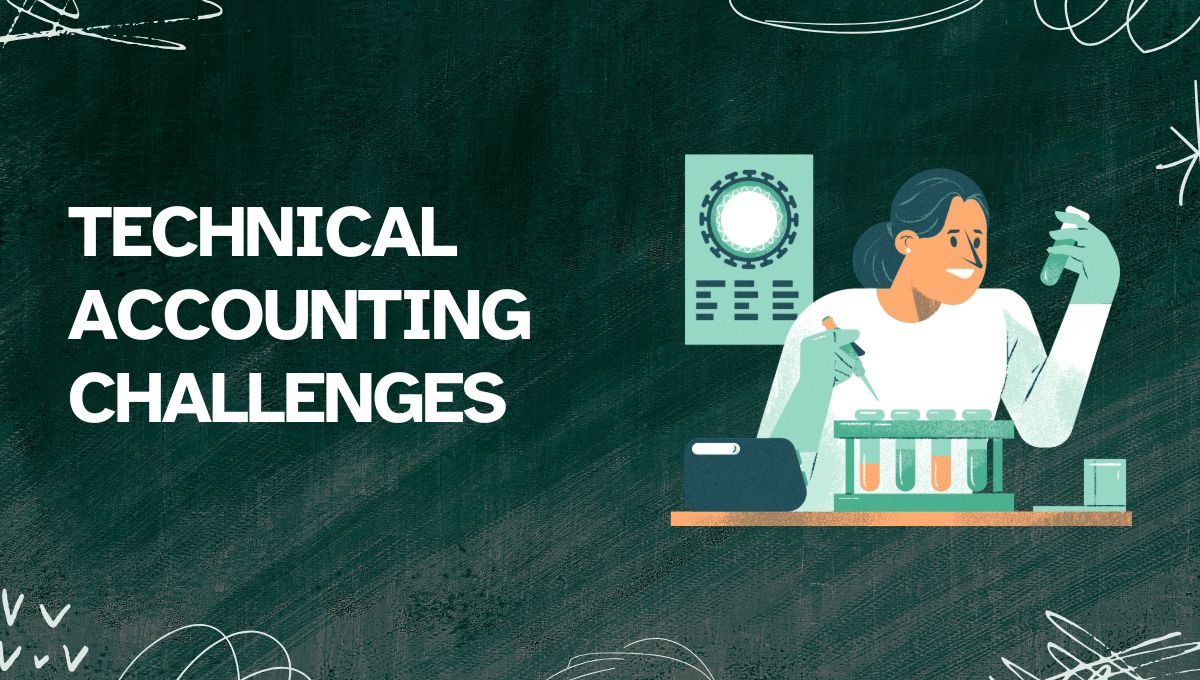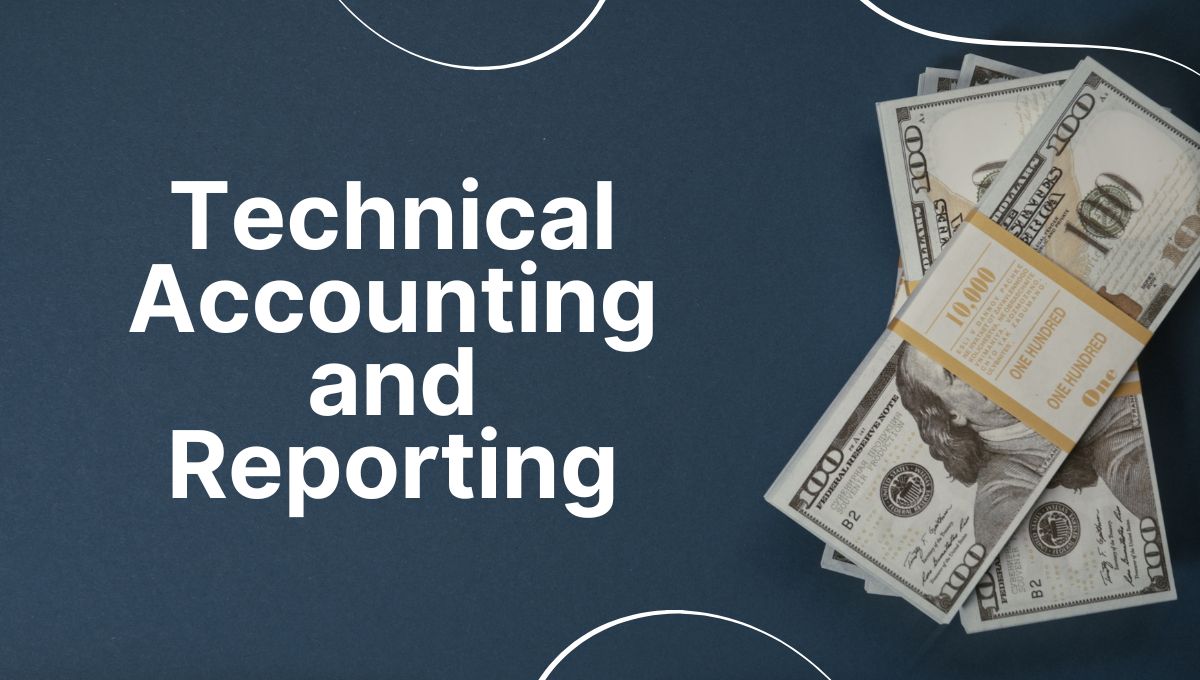People often overlook that financial statements deliver complex information through numerous judgements under evolving rules as auditors maintain constant urgency to complete their reports.
Technical accounting isn’t just about crunching numbers; it’s about decoding regulatory changes, interpreting financial reporting nuances, and translating them into accurate disclosures.
Financial professionals working in India experience genuine stress at work. When you combine a mixture of global accounting standards with mergers in addition to IPOs and fast digitalisation processes, you face confusing situations unless you have proper knowledge of navigation.
This blog explores the most pressing challenges in technical accounting and, more importantly, how to overcome them with clarity, confidence, and the right skills.
What is technical accounting?
Accountants record and process information about economic entities, such as businesses and corporations—this practice is well known as accounting or accountancy.
Technical accounting deals with the interpretation and implementation of complex accounting standards like IFRS, Ind AS, and US GAAP. It’s not just about recording transactions—it’s about understanding how to present financial truth in compliance with the standards that govern capital markets.
The Most Common Challenges in Technical Accounting
IT industry body Nasscom stated that India’s IT exports rose by 3.3% in constant currency in the 2023–24 financial year.
Let’s take a closer look at the most pressing challenges professionals face in this space—and explore actionable ways to tackle them head-on.
1. Constantly Changing Standards and Guidelines
If there’s one thing accountants can count on, it’s change. Regulatory bodies frequently revise standards, leaving finance professionals scrambling to update processes.
Why it’s a challenge:
- It requires continuous learning and real-time adaptation.
- Incorrect application could lead to misstated financials or even regulatory penalties.
How to overcome it:
- Stay subscribed to ICAI, IFRS, and regulatory newsletters.
- Participate in forums, webinars, and short modules offered as part of a CPA course.
- Build internal processes that review standard updates quarterly.
Tip: Keep a compliance calendar pinned above your desk—it sounds old-school, but it works wonders!
2. Complex Judgements in Revenue Recognition
Recognising revenue may sound simple. However, under IFRS 15 or Ind AS 115, it involves a five-step model that requires immense discretion—especially in service-based or subscription models.
Why it’s a challenge:
- Requires both legal and financial understanding.
- Often needs coordination between sales, legal, and finance.
How to overcome it:
- Create revenue recognition checklists and test scenarios internally.
- Consult with audit partners early in the year—not just at year-end.
3. M&A and Business Combinations Accounting
Mergers and acquisitions bring prestige—and an accounting nightmare. Fair value measurement, goodwill recognition, or contingent consideration—all these make the process tricky.
Why it’s a challenge:
- Involves a blend of accounting, valuation, and legal judgement.
- Mistakes can impact shareholder equity and tax implications.
How to overcome it:
- Work closely with valuation experts.
- Develop an internal SOP for acquisition accounting, especially if you’re in a high-growth firm.
Common Errors in M&A Accounting (2024 Survey)
| Error Type | Frequency (%) |
| Misstated Goodwill | 41% |
| Incorrect Fair Value of Assets | 27% |
| Deferred Tax Errors | 18% |
| Others | 14% |
4. Lease Accounting and Financial Instruments
Lease liabilities and derivative accounting often trip up even experienced accountants. With standards like IFRS 16 or Ind AS 116, companies must recognise lease liabilities and right-of-use assets.
Why it’s a challenge:
- Involves judgement on lease terms, discount rates, and variable payments.
- Derivatives add a layer of valuation and hedge effectiveness.
How to overcome it:
- Use robust software to manage lease data and automate calculations.
- Learn the foundational concepts through a CPA course or technical upskilling workshop.
5. Lack of Proper Documentation and Audit Trail
Even if your accounting is perfect, the absence of documentation can put you at risk. Auditors rely heavily on workpapers, assumptions, and memos.
Why it’s a challenge:
- Busy teams often skip documentation to “save time.”
- Memory fades, especially during final audits or peer reviews.
How to overcome it:
- Write technical accounting memos regularly.
- Maintain version control and approvals in shared folders.
Essential Docs for Technical Accounting Clarity
| Document Type | Frequency | Owner |
| Accounting Position Memo | Quarterly | Finance Lead |
| Assumption Backups | Monthly | Team Member |
| Review Sign-offs | Per Use Case | Reviewer/Auditor |
Technical Accounting Skills You Must Build
To thrive in this space, you need more than just book knowledge.
Let’s list down core technical accounting skills recruiters and interviewers love to see:
- Ability to interpret IFRS, GAAP, and Ind AS standards
- Expertise in financial valuation principles
- Experience with lease accounting software and ERPs
- Technical memo writing and policy development
- Cross-functional collaboration (especially legal & audit)
Pro Tip: Prepare for interviews with real-world case studies—not just theory. Most technical accounting interview questions now include scenario-based assessments to test practical applications, not just textbook knowledge.
Turning Challenges into Career-defining Opportunities
Yes, technical accounting can be complex. But here’s the silver lining—it is one of the few areas in finance where you can truly stand out by combining intellect with integrity.
Mastering technical accounting skills makes you valuable to your employer and gives you confidence in making high-impact financial decisions. Whether you’re preparing for a promotion, tackling technical accounting interview questions, or pursuing a CPA course, these challenges are stepping stones—not roadblocks.
So, don’t run from the technical—lean into it. That’s where transformation begins.
Become a Globally Recognised CPA with Imarticus Learning’s US CPA Course
The CPA course from Imarticus Learning is in high demand across India, with MNCs actively seeking professionals who possess strong technical accounting skills and knowledge of global accounting standards. Indian CPAs are well-positioned to take on leadership roles in corporate governance, reporting, and international assignments.
Holding a US CPA opens doors to opportunities not only within India but across global markets. Employers highly value the blend of technical expertise and strategic insight that certified professionals bring to the table.
Strengthen your technical accounting skills through practical training in MS Excel, Advanced Excel, and case-based simulations using Capsim tools. Receive continuous mentoring from a dedicated team of CPA and CA faculty members. Our dual-teacher model ensures 24/7 support for doubt clearing, concept clarification, and exam readiness.
Unlock your potential, earn global recognition, and shape a successful future in finance with our US CPA course. Start your CPA journey now—with confidence and expert support at every step.
FAQ
1. What is technical accounting, and why is it key?
Technical accounting means using rules like IFRS and GAAP in real deals. It’s vital for accurate financial reporting.
2. What are the core technical accounting skills needed now?
Key skills include interpreting standards, drafting technical memos, managing complex transactions, and understanding systems used in financial reporting.
3. How can I prepare for technical accounting interview questions?
Review recent changes in standards, practice real-world case studies, and prepare examples from your experience to demonstrate your judgement and analysis.
4. Can a CPA course help in learning technical accounting?
Yes, a CPA course gives you strong know-how on rules and how to use tech steps in real-world jobs.
5. How do firms deal with technical accounting in world-wide operations?
They often hire in-house specialists or partner with experts to ensure compliance across multiple jurisdictions with varying accounting regulations.
6. Why do firms want staff with technical accounting skills?
Firms need pros who can read the rules right and ensure clean audits, accurate reporting, and legal compliance under pressure.


